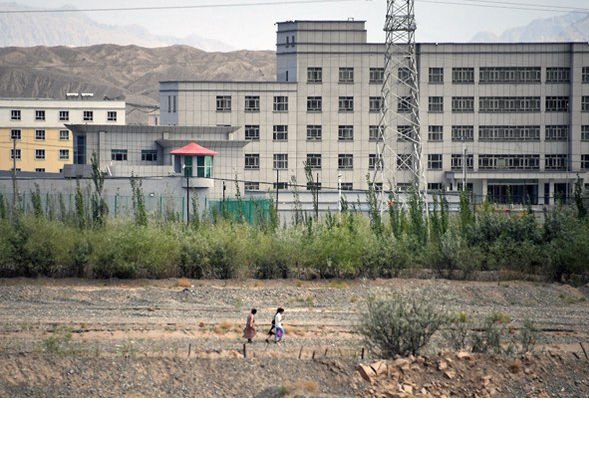Uyghur teacher Setiwaldi Kerim held for work on literature textbooks

Setiwaldi Kerim was passionate about teaching Uyghur literature at a middle school in Atush, in China’s far-western Xinjiang region, where he worked his entire career.
He even collaborated with a group of educators who specialized in the Turkic language spoken by the more than 11 million inhabitants of the region to work on literature textbook project for middle-school and high-school students. Kerim worked with other scholars under the leadership of Sattar Sawut, the head of Xinjiang’s Education Bureau.
Kerim, now about 52, loved teaching so much that he also wrote a book on his own titled My New Classroom, based on his classroom experiences while teaching the material in the textbooks at Atush’s No. 1 Middle School.
He also wrote stories for the Uyghur publication Kezilsu Literature and was a social activist who gave public talks on his book of recollections and teaching methods at literature and art events.
Just before Kerim was about to retire in 2017, his career came to an abrupt halt when authorities arrested him for promoting separatism in his books, local police told Radio Free Asia, without mentioning specific texts.
“Setiwaldi Kerim’s only so-called crime was his exemplary role of teaching these new textbooks,” said Abdulweli Ayup, a Norway-based Uyghur activist and linguist, originally from Xinjiang’s Kashgar, who maintains a database of detained Uyghurs. “He represented a group of teachers who supported the new textbooks.”
Attempts to erase Uyghur culture
In 2017, Chinese authorities intensified their crackdown on Uyghurs and other Muslim Turkic minorities and began detaining them in prisons or “re-education camps” to receive what they said was vocational training to prevent “religious extremism” and “terrorism” in the restive region.
They targeted Uyghur intellectuals, including language and literature teachers, prominent businesspeople and Muslim clerics in a wider effort to erase Uyghur culture.
Kerim was sentenced to 19 years in prison, a public security employee in Atush, capital of the Kezilsu Kyrgyz Autonomous Prefecture in western Xinjiang, recently told Radio Free Asia.
“We arrested him when he was about to retire in 2017,” said the person, who declined to be named so she could speak freely about Kerim.
“I cannot tell you why we arrested him,” she added.
The teacher’s name is included on the list of detained and missing Uyghurs compiled by Ayup’s Uyghuryar Foundation, an advocacy and aid organization also known as Uyghur Hjelp in Norwegian. The organization has identified more than 20 teachers and listed their names on a list of imprisoned Uyghur scholars.
“Setiwaldi Kerim was an outstanding implementer and interpreter of the newly compiled Uyghur literature textbooks,” said Ayup, the organization’s founder.
Kerim, who hailed from Otyagh village Ustunatush township began teaching at the middle school in Atush shortly after he graduated from Xinjiang University with a degree in literature, and taught the subject until his arrest.
Ayup said his detention was likely due to the Uyghur literature textbook project for middle-school and high-school students during the late 1990s and early 2000s.
Excellent teacher award
Kerim was an outstanding pedagogue who played an exemplary role in demonstrating the success of the newly compiled textbooks, Ayup said. Kerim even won an “Excellent Teacher” award at a conference on the new textbooks in Atush in 2004.
“The impact of the newly compiled textbooks had been deep and wide,” Ayup told RFA. “These textbooks became the Chinese government’s target because they described Uyghur history, culture and customs very well.”
“The Chinese authorities used these textbooks as an excuse to directly target and attack Uyghur scholars and writers like Setiwaldi Kerim,” he said. “People like him supported these textbooks, and they passionately taught their contents in their classrooms.”
As part of the widespread crackdown on Uyghurs in Xinjiang, Chinese authorities not only prohibited school textbooks they had previously approved, but also arrested scholars who participated in their writing and compilation.
Chinese authorities also handed down jail sentences to Yalqun Rozi, Tahir Nasir and Wahitjan Osman, other Uyghur scholars who worked on the textbooks, according to Ayup.
Authorities also imprisoned Abdurazaq Sayim and Alimjan Memtimin, former publishers who directed the compiling of the textbooks, while Sawut Sattar, head of Xinjiang’s Education Bureau, received a death sentence with a reprieve.
— A RFA report, Mar 4, 2023
Copyright © 1998-2020, RFA.
https://www.rfa.org/english/news/uyghur/setiwaldi-kerim-03032023152004.html
-
Book Shelf
-
 Book Review
DESTINY OF A DYSFUNCTIONAL NUCLEAR STATE
Book Review
DESTINY OF A DYSFUNCTIONAL NUCLEAR STATE
- Book ReviewChina FO Presser Where is the fountainhead of jihad?
- Book ReviewNews Pak Syndrome bedevils Indo-Bangla ties
- Book Review Understanding Vedic Equality….: Book Review
- Book Review Buddhism Made Easy: Book Review
- Book ReviewNews Elegant Summary Of Krishnamurti’s teachings
- Book Review Review: Perspectives: The Timeless Way of Wisdom
- Book ReviewNews Rituals too a world of Rhythm
- Book Review Marx After Marxism
- Book Review John Updike’s Terrorist – a review
-
-
Recent Top Post
-
 CommentariesNews
Ides of trade between India and Pakistan
CommentariesNews
Ides of trade between India and Pakistan
-
 CommentariesTop Story
Palestinians at the cross- roads
CommentariesTop Story
Palestinians at the cross- roads
-
 Commentaries
While Modi professes concern for the jobless, “his government’s budget escalates class war”
Commentaries
While Modi professes concern for the jobless, “his government’s budget escalates class war”
-
 CommentariesNews
Politics of Mayhem: Narrative Slipping from Modi ….?
CommentariesNews
Politics of Mayhem: Narrative Slipping from Modi ….?
-
 Commentaries
Impasse over BRI Projects in Nepal
Commentaries
Impasse over BRI Projects in Nepal
-
 CommentariesNews
Yet another Musical Chairs in Kathmandu
CommentariesNews
Yet another Musical Chairs in Kathmandu
-
 CommentariesTop Story
Spurt in Anti-India Activities in Canada
CommentariesTop Story
Spurt in Anti-India Activities in Canada
-
 NewsTop Story
Nepal: Political Stability Under Threat Again
NewsTop Story
Nepal: Political Stability Under Threat Again
-
 NewsTop Story
Accountability Tryst With 2024 Ballot….
NewsTop Story
Accountability Tryst With 2024 Ballot….
-
 NewsTop Story
What Would “Total Victory” Mean in Gaza?
NewsTop Story
What Would “Total Victory” Mean in Gaza?
-
AdSense code



















